|
|
Sunday, February 1st, 2009 at 11:03 pm
Also today, I made contact with the Cascade Medical Team based on a lead I got from Nancy Hughes while we were networking in Antigua last week. They are a team of doctors affiliated with HELPS International and they basically transport a hospital full of people and equipment down to Guatemala for a week or so every year, to help people that are too poor to afford health care. When she mentioned them, it remeinded me of a guy in our town that I met about a month ago. His name is Francisco, and he mentioned in passing that he has been blind in one eye for a few years; how he tells it, he noticed his vision in one of his eyes getting hazy around the edges, then over the course of a few months, if just got worse until he could no longer see out of that eye. But now, he says, his good eye started the same problem about a month ago. He told me this with maintained calm, but I can tell he is pretty terrified that he will be completely blind in his remaining eye in a few more months. “I probably shouldn’t drive my truck anymore,” he said, “but it’s how I make a living. I need to keep doing it as long as I can.” Life for him in Guatemala will be pretty tough as a blind man.
I am not a doctor, but it sounds like cataracts to me. And if that’s the case, he is going to be blind. But I emailed the Cascade Medical Team, and they say they are bringing eye surgeons with them when they come in February. They asked me to get Francisco’s full name, and to find a way to get him to Sololá (in the south) where they are setting up for surgery from March 1-9. “If we set it up beforehand, he can just skip the line,” they said. So, Emily and I went to talk to Francisco today. We explained everything, and reiterated that nothing was for sure yet. Nonetheless, he seemed pretty overcome with hope. He and his family are going to discuss amongst themselves how to fund the trip to Sololá.
I really feel like if I can help this guy out, then my time here will be worthwhile even if I get nothing else accomplished.
Posted by: jfanjoy
Saturday, January 31st, 2009 at 6:38 pm
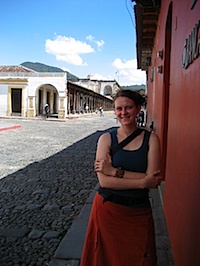 We just got back from Antigua, City of Adventure. Or, as we often call it, “Gringolandia” because of all the tourists. As usual, Antigua was sunny, cool, breezy, cosmopolitan. The food is great, the beer cold, the showers hot. Here’s Emily smiling all day long. I’d like to say it was a vacation, but really we went to a lot of meetings to network with international development organizations. We just got back from Antigua, City of Adventure. Or, as we often call it, “Gringolandia” because of all the tourists. As usual, Antigua was sunny, cool, breezy, cosmopolitan. The food is great, the beer cold, the showers hot. Here’s Emily smiling all day long. I’d like to say it was a vacation, but really we went to a lot of meetings to network with international development organizations.
We first met with the friendly people of StoveTeam International. Their specialty is the design, research, and proliferation of inexpensive and highly efficient stoves. In the few days we spent together, I got to really appreciate them for their kindness and earnest interest in making the world a better place. They took us on a tour of their factory, where they make a few different versions of a stove that uses 50% less wood, produces nearly no smoke, and is impossible for kids to fall into. It’s WAY better than the open fires a lot of Guatemalans cook over. We invited our boss Basilio to accompany us, and now he’s interested in looking into the technology further, even to the extent that he wants to bring all the volunteers back to the factory for our in-service training in a few months. Here’s pictures of the three stoves:
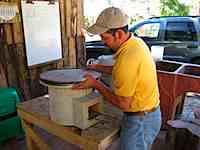 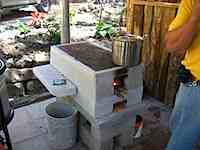 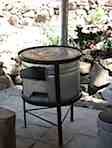
Their factory was a pleasant, open-air affair with a half-dozen workers, all appearing relatively content and well-treated. Of course, you still have the typical Guatemalan problems; for example, I saw a guy welding without using goggles. Apalling. I mentioned it to the foreman, and he said they guy just won’t wear them. That doesn’t cut it with me; that dude will be blind in just a few years, whether he realizes the impact of his actions or not. I brought this to the Stoveteam’s attention, and they seemed concerned but caught off-guard. Like many specialists, they missed it because they were pretty absorbed in the discussion about their area of interest: stoves.
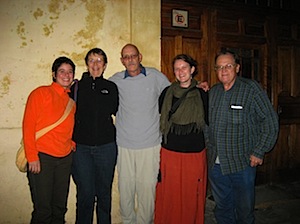
Many of the Stoveteam people are also Rotarians. This is exciting for Emily’s dad (a Rotarian himself), but also for us: this international organization does a ton of aid work, and has a lot of power available for good, both in terms of “connections” as well as brute cash. For a few weeks we’ve been trying to hook up with Rotarians from both the Antigua area as well as Huehuetenango (a little closer to us). It’s tricky, with all the email communications and so forth. But StoveTeam had planned on meeting with the local Rotary guy Thursday, so Emily and I made the tough decision to extend our trip a day to meet him in person, wrecking our budget in the process. However, when the hour of the meeting arrived, he called to say he had to skip it to be with his wife because she needed surgery. That day wasn’t as fruitful as we’d hoped it would be.
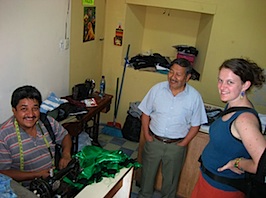 At the end of our trip, we were able to squeeze in a little time with Froilan, my host dad from training. We’ve sortof started this tradition of taking him to lunch when we’re in town. This is kindof easy, as he owns a tiny tailor shop just off of the main drag in Antigua and just closes the shop for a few hours when we show up. We had a great lunch, talking and laughing and smiling. He was SO kind and helpful to me during training, and it’s nice to have someone in Antigua that we know is a real friend. This time out, we went to Freida’s, a somewhat costly (for all of us, anyways) place that we’ve been talking about as a joke for months. He knows I am poor, and I know he’s poor, so I told him a white lie to make sure he didn’t pay: that my dad wanted to treat him, so I was going to charge it. My dad DID give me some money for christmas, so I took the cash from there. The exchange rate makes dollars go a LONG way in Guatemala. At the end of our trip, we were able to squeeze in a little time with Froilan, my host dad from training. We’ve sortof started this tradition of taking him to lunch when we’re in town. This is kindof easy, as he owns a tiny tailor shop just off of the main drag in Antigua and just closes the shop for a few hours when we show up. We had a great lunch, talking and laughing and smiling. He was SO kind and helpful to me during training, and it’s nice to have someone in Antigua that we know is a real friend. This time out, we went to Freida’s, a somewhat costly (for all of us, anyways) place that we’ve been talking about as a joke for months. He knows I am poor, and I know he’s poor, so I told him a white lie to make sure he didn’t pay: that my dad wanted to treat him, so I was going to charge it. My dad DID give me some money for christmas, so I took the cash from there. The exchange rate makes dollars go a LONG way in Guatemala.
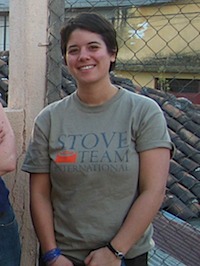 So, the last thing we got out of our trip is Elke. She’s an intern with StoveTeam, and she researches stove perfomance on-site by interviewing families, making observations, and taking tests with specialized air sampling apparatus. We spent some time with her during our week in Antigua, and now we’re taking her hack to our site to see the “real Guatemala”. She’s pretty experienced with this sort of thing already; she speaks Spanish and has traveled in Mexico and other parts of Latin America. But her experience with indigenous families is less, so we’re going to introduce her to some of our neighbors. Then, once she’s starting to get used to that, we’re going to drop her into the Real Nitty Gritty: Quixabaj. I’ll let you know how that goes. So, the last thing we got out of our trip is Elke. She’s an intern with StoveTeam, and she researches stove perfomance on-site by interviewing families, making observations, and taking tests with specialized air sampling apparatus. We spent some time with her during our week in Antigua, and now we’re taking her hack to our site to see the “real Guatemala”. She’s pretty experienced with this sort of thing already; she speaks Spanish and has traveled in Mexico and other parts of Latin America. But her experience with indigenous families is less, so we’re going to introduce her to some of our neighbors. Then, once she’s starting to get used to that, we’re going to drop her into the Real Nitty Gritty: Quixabaj. I’ll let you know how that goes.
Posted by: jfanjoy
Friday, January 30th, 2009 at 8:28 pm
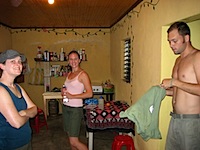 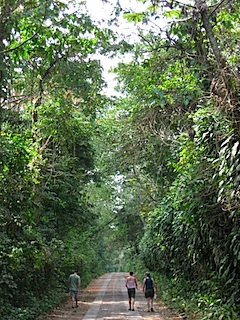 Whenever we travel, Emily and I try to make sure our path takes us through a town with friends. This means a free place to sleep, but more importantly, we get to see what other Peace Corps volunteers are doing. In the case of our friends Joe and Katy, we get the third benefit of shooting the breeze with people that we really like. Whenever we travel, Emily and I try to make sure our path takes us through a town with friends. This means a free place to sleep, but more importantly, we get to see what other Peace Corps volunteers are doing. In the case of our friends Joe and Katy, we get the third benefit of shooting the breeze with people that we really like.
They just moved to a new site. That’s not normal; volunteers usually serve the same community their entire 2 years. The problem was, their previous site had been receiving aid from various international aid groups for about 10 years, and the site made unsuitable by “bad development work.” This happens when a well-intentioned charity group comes in with a lot of money and goodwill, but little time or experience, and accidentally does more harm than good. They give out latrines, stoves, etc. to the eager villagers, but don’t train them in the importance of the technology, how to maintain it, or why it’s even there in the first place. After a few years, the latrine starts to smell (not adding ash, or plugged vent) and the stove starts to smoke (not cleaning the chimney). Before long, the villagers revert to how they used to do things: pooping in the fields, making a fire on the floor. Those expensive latrines become chicken coops, and the stoves sit cold and serve as a dining room table. But the worst part? Not only are the people back where they sarted, but when a group like Peace Corps comes along with our message of education, they aren’t interested. “How come you guys don’t give us stuff? Why should we waste our time listening to your talks?” The natives have already reverted to a welfare state.
That, in a nutshell, is “bad development work.” We fight it a lot, and even the big names in charity are guilty: here’s an example. To apply for a grant from Habitat for Humanity, one has a MUCH better changce of getting it if they can read and write (to fill out the forms, or to even know that Habitat exists in the first place). As a result, the people that get these houses are already in the top half of the economic stratus. That being the case, these houses often are built for a future son-in-law or some other absent person, as a sort of “savings plan” for the family. In villages such as these, there is often a housing shortage as well. The new Habitat house stands empty, as the family is “saving” it for the future son-in-law. It’s about then that the Peace Corps places a volunteer in town, and BAM! suddenly you have a meeting between the only person in town that earns enough cash to pay rent, and the only family in town that owns a vacant space. So, in effect, Habitat builds houses for Peace Corps volunteers. Joe and Katy’s old site even has one of these cases right now.
But, back to their new site. In case the title didn’t give it away, they live in the jungle. As our bus made the multi-hour trip down from Xela, I noticed it getting pregressively more hot and humid as we continued our descent. Theirs is REALLY different than our site; in fact, it reminds me a little of Virginia in August: bug noises, wildlife abounding, palpable humidity, and heat that makes you just want to lie around all day. Katy was quick to point out that this is the cool, dry season for them… I shudder to think of the misery involved with the “hot” season. But they’re from southern California, so they’re used to it. Maybe they even like it?
 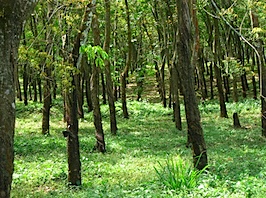 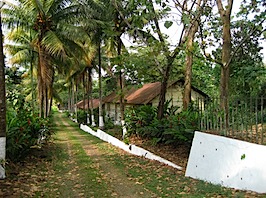
Of course, when you go to the jungle, you have to check out the crazy plants. Here we are posing next to some huge bamboo plants, followed by a plantation of rubber trees (if you click and enlarge the picture, you can see the taps and rubber reservoirs). Also, the jungle area of Guatemala (which is most of it, by the way) has long been the stronghold of coffee and fruit fincas, or plantations. We passed a few as we walked with them to an outlying village. Joe says that most of their villagers work on these fincas, and although conditions have improved since the first half of the 20th century (when United Fruit Company forced the natives into slave labor), the living conditions of these workers can still be considered “squalid” by most standards.
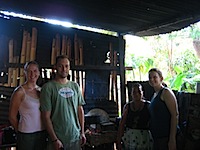 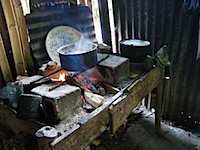 At their aldea, J&K introduced us to a midwife they’re working with. She was an energetic, peppy lady; I could hardly believe she was in her 60s. She proudly claimed to have presided over more than 300 births, though we didn’t ask what her win/loss ratio was. J&K are planning on building her a stove, to drum up community interest for some development projects. She showed us her current kitchen, which was pretty standard fare for Guatemala. I’ve enclosed a picture. At their aldea, J&K introduced us to a midwife they’re working with. She was an energetic, peppy lady; I could hardly believe she was in her 60s. She proudly claimed to have presided over more than 300 births, though we didn’t ask what her win/loss ratio was. J&K are planning on building her a stove, to drum up community interest for some development projects. She showed us her current kitchen, which was pretty standard fare for Guatemala. I’ve enclosed a picture.
Posted by: jfanjoy
Thursday, January 22nd, 2009 at 9:22 pm
January 19 was an awful day in the news, in case you didn’t notice. We generally read the BBC online because it’s free, and they’ve got very broad coverage. It’s my habit to read articles throughout the day when I find myself with time, in order to keep up. Early in the morning I read about the Taleban burning schools in Pakistan in order to keep girls out of them. The teachers won’t teach and the parents won’t send their children (read: girl children) where the schools are still standing for fear of retaliation. Also in the news that morning, the Lords Resistance Army operating in DR Congo and Uganda burned down a church full of people during an important religious ceremony, killing them all. The LRA has also kidnapped a reported 150 children since Christmas Eve, presumably new trainees for their army.
In the afternoon, Gaza is in ruins (could not find original story but this doctor’s story is also harrowing) after this complicated and confusing conflict between Hamas and the Israeli goverment, who planned to have all their soldiers out of Gaza before Obama swore in. Nice that they could make such a strategic political move out of that. Pictures were of old women sitting amongst the rubble that remains of their home. Robert Mugabe, self-appointed Lord of Zimbabwe, continues to find a million ways to not share power, to not back down to the man who won the most votes in the last election all while denying the cholera epidemic that is killing hordes of people in the country. And what made me most upset, who knows exactly why, a Russian human rights lawyer was shot dead in the street after speaking out against the early release of a soldier who killed an 18 year old Chechen woman (or was she only a girl still?) during an interrogation, strangling her out of frustration. Also killed was a journalist who was walking with him at the time.
By late-afternoon I began to wonder, “What am I even doing here?” Really, can we do anything substantial? There are times it gets to me so badly. We aim to be positive, to be sure that we can make a difference as volunteers, that what we’re doing really matters. But sometimes amidst all the noise coming in from everywhere, reports of violence so twisted, so far reaching into the past it seems they’ll always mangage to continue into the future as well, how can we be sure? Maybe it’s that we can’t be sure, and this is all an act of faith we hope doesn’t amount to delusions of grandeur in the end.
I keep thinking about the crisis the United States is facing, this economic crisis. I want to understand so I keep reading, but I fail to have nearly as much as sympathy for US citizens. We’re talking lost homes in the states, but did those people lose every memory object: pictures, trinkets, a family member (or 29 family members as in some of the worst cases in Gaza)? I’m certain it’s emotionally harrowing to have your home repossessed, I’m not denying that. But at least it wasn’t bombed with everything or anyone in it. Not to mention, the fault of a repossessed house can often be attributed, at least in part, to an owner who wanted too much. Not really the case with bombings. Our children aren’t being kidnapped and made into soldiers. Our girls are not sitting uneducated, trapped by fear for their lives and the thought that maybe it’s not natural for them to be learning things. The human rights lawyer and the journalist really get me though. How many educated professionals walking the streets in the US are worried about losing their heads, literally, over doing their jobs to the best of their ability, with a sense of moral responsibility? It does happen, sometimes. I know it does, but it seems so infrequent. We do have a military engaged at the moment in Iran and Afghanistan. We mourn for the soldiers we lose, as we should. But how many families are able to see beyond that; to mourn for the situation itself rather than the single incident that most affected them?
In my last post I talked about how different places need to be held to different standards, and I think it’s true. But should we ignore the difference in standards because we live in one place and not the other? I guess I am most disturbed by the thought that the majority of Americans are not privy to these news stories because our media often fails to report them, and in general we’re not readily taught to go beyond our immediately available sources.
Two days ago, January 20, our new president gave his first address not only to the United States, but to the world. How many swearing-in ceremonies of foreign presidents stop the United States’ media from commercial interruption for full-length, live coverage? Is that telling? Anyway, one of the things he said addressed this nagging pain in the pit of my stomach: “[W]e can no longer afford indifference to suffering outside our borders…” This beautiful quote was preceded by what could almost be my job’s mission statement: “To the people of poor nations, we pledge to work alongside you to make your farms flourish and let clean waters flow; to nourish starved bodies and feed hungry minds.”
In the afternoon as coverage of the US’s historical moment waned, we went to give a talk on healthy pre-natal habits to the women of our village. Remember, the highest maternal mortality rate in Guatemala is right here. We began as always by asking questions to get them thinking, to make the broad subject personal. The question to their own experiences was answered with 94 women and girls’ expectant stares, not a single word issued forth. Our two translators re-phrased and re-re-phrased the question. Nothing. Finally one of the translators, also a teacher, said to us in Spanish, “They won’t answer the question. They’re not animated to answer the question because for their whole life they’ve been taught not to participate, not to speak.” I found myself close to tears on accident, in what is probably a classic Peace Corp experience for many a volunteer, of nearly losing my cool. I wanted to cry, or fight crying by jumping around and hollaring, I don’t know what, something like, “SPEAK! THIS IS IMPORTANT! YOU CAN’T SOLVE PROBLEMS IN YOUR COMMUNITY WITH SILENCE!”
Even if I’d yelled, it would’ve made no sense to them, or not enough to affect a change, I know it. How am I supposed to get them to suddenly speak? If only they had any idea of the value in their stories and experiences; if only I could help them realize that. But sometimes these tasks seem too huge, too beyond me. And in that moment, I realized the women here have much in common with the women of Afghanistan, even if they will never know of each other or their shared experiences in life. You know, the funny thing is the women here thank us profusely before, during, and after every talk; but though our talks are meant to be largely participatory, it’s like pulling my hair out to get them to send one woman up as a volunteer to complete the easiest task. I felt tremendously defeated.
Here is a long side-story that will connect to all of the above in the end, I promise:
As we were making our way south to come home for Christmas, this sort of beautiful, funny thing happened. We were at Subway in the mall in Xela. I was actually in the bathroom, but had left Fletch seated with our food at a two person table. I came back to find him standing over a table of Guatemalan women in indigenous dress and a few young boys speaking Q’anjob’al with wild hand gestures. I thought, “What is he doing? No one here speaks Q’anjob’al.”
Turns out there was a Swedish boy with the family who had come over and asked Fletch where he was from, in English. He said he was from the states, and this pasty, slightly plump Swedish kid said the table of indigenous women had sent him over to ask. So Fletch asked him the next obvious question, “What are you doing with them? Do they speak Spanish or Swedish or what?” The kid informed him that they speak Spanish, Q’anjob’al, and one of them speaks Swedish. So Fletch jumped up and said, “Watx’ me hak’ul?” or “How are you?” The women stood up and pulled our table up to theirs, as they began interrogating him as to how he learned their language. This is when I walked in. They were thrilled almost to tears, no exaggeration, that a couple of whiteys were sitting here in the mall speaking their language so far from where anyone even knows it exists. The mother asked, “Would you like to come visit my house?!” We all spoke at length as they bought coffees for themselves and me, and we figured out everyone’s stories.
The mother and her adult daughters where born in Santa Eulalia, speaking Q’anjob’al, but moved further north to Barrillas at one point, presumably to make a living on the warm land crops there, as the civil war settled down. It was a hard time to live in Barillas, much harder than living in Santa Eulalia. The mother began working with a Swedish employee of the United Nations, who was there to help the war refugees that had fled to Mexico move back into Guatemala and re-establish their families with land. I can’t begin to imagine how difficult a job that would be, though I had a glimpse of it in a book I read before coming called Voices from Exile. Anyway, the Swedish man met the oldest daughter, they married, and moved to Sweden where the daughter works as nurse and has learned the ways of more liberated women–her words, not mine. They moved their mother to Xela where life was easier, for reasons of more accessible healthcare and better infrastructure. She misses her home though, which was why she was almost in tears when we spoke her language and called her by her Q’anjob’alese name, Anix, instead of Anna. She said the disturbing thing about living in Xela is the number of people who not only don’t know that Guatemala suffered a civil war (incredible, sad, true), but they even voted for Rios Montt in the last elections (president blamed for much of the worst killings of indigenous people). She said she also misses the coffee from up north, and was so pleased to find that I buy it green and roast my own. She says they brought a quintal of green coffee with them when they moved; that’s a one hundred pound bag for those of you who don’t know. Sadly, they’ve run out.
Anix shared her disdain for the word gringo, and shared with us the comments of some of her friends when her daughter, who moved to Sweden but still wears her indigenous clothing at least while at home, did not have children right away. “Could it be that gringos are not good at making babies? Is it harder for them?” she laughed at the absurdity of this. Her views and ideas were so astoundingly liberal. I spoke at length with her daughter, Xuin, Juana in Spanish, about her experiences in Sweden. She was so wonderful to speak with. She was in Guatemala at the moment because her gringo husband had finally managed to impregnate her (read sarcasm here: nothing is wrong with the reproductive organs of either partner) so she had a liberal European maternity leave which she chose to spend most of in Guatemala. As great as the conversation was, we had to get going, so we began saying our good-byes. Xuin said to me, “The work you’re doing here is wonderful, thank you so much. But please, don’t despair. Sometimes when I go out and see women standing in the hot sun with their babies strapped to their back waiting for buses, I begin to cry. My mother says maybe I just shouldn’t go out, but I can’t do that. Just don’t despair, stay hopeful.”
Like some of Obama’s words, Xuin’s were beautiful, but so much easier said than done. So here I am, despairing a little, sometimes a lot. I always bounce back, so don’t worry much on my account. I just feel this is worth sharing because this blog would be a false representation of our time here if I didn’t include this stuff too. I don’t think the world is coming to an end; rather, I realize it’s always been a pretty rough place and it’s always been rougher in some places for some people than for other places and people. I just want to yell, “PAY ATTENTION!” and yet, I don’t want to be preachy, so I’m sort of stuck. These are just my thoughts. Do as you will, please.
I’ve been thinking and thinking, mulling things over for the last few days really, and a light spot came when Lina, Galindo’s teenage sister, came over to our house for baking lessons before going to school. We’ve been doing lots of biscuits lately, but decided to shake things up and do cookies. It’s been fun explaining things to her. She’s really willing and excited about things while we’re baking, and we get to talk about all sorts of things. And then I started thinking, these are cookies for peace, really. We’re just doing the best we can, to share and learn and grow, right here, right now, January 22. We can’t do anymore than this at this moment, just bake cookies for peace.
Best to you all.
Emily
*A related note*
I came across this book about a month ago that blew me away. It’s called What is the What? by David Eggers, the story of one of the Lost Boys of Sudan and how he made it to the US. It’s an eye-opener on so many levels, but written in a way that you’re dying laughing often and in tears at a few very select moments. What was amazing to me were the similarities between being a Sudanese immigrant in the US and a Guatemalan immigrant US. The way they conduct their communal meetings, they way they have to deal with so much in their new country yet their homeland never lets them go. If you want something poignant and mind-boggling this book is it. Read it, if you please, and you’ll feel you have a better grasp on some things we experience here.
Posted by: emily
Thursday, January 22nd, 2009 at 1:38 pm
Today I had a very “Peace Corps” experience, and I want to share it. Two of the neighborhood kids that we’re buddies with (Chalio and Alberto) came up to me this morning and said they were going to go shepherding, and would I like to go with them. As they know, I like that sort of thing, so I said OK and we were off. After about 10 minutes of walking in the countryside without sheep, I started to get suspicious. Turns out, they ACTUALLY were assigned by their grandma to take a lunch to Nas Palas, our good friend who also happens to be their grandfather. The kids didn’t figure I’d go with them for such a mundane task. They were wrong.
We finally came across Nas Palas, working in a field near the next village, a field that I had seen before but never realized was his. Many of the Mayan farmers have small fields scattered across the valley, in no sensible order, as a result of generations of complex inheritances and subdivisions. When he saw us, he stopped what he was doing and we sat down together. The kids passed off their cargo of lunch, and began playing in the dirt with some toy cars they also brought with them. Thus, I was blessed with the accidental opportunity to talk to Nas Palas about life.
He’s a friendly, ralaxed guy but he spends a lot of time watching what goes on around him, and he applies a critical eye to what he sees. Besides his selfless community involvement, which I’ve talked about a few times before, he’s also a farmer. Farmers today tend to have a stereotype of being dumb guys that stick plants into dirt, but that’s not usually the case. They are very connected with the earth, and oftentimes have the pulse of the planet. They watch the shifting weather, note which crops thrive in each location, and try to make the soil more fertile for the next season.
He explained that they plant different types of corn seeds in different fields, depending on the altitude. The white corn is very tall, so it only gets planted in the valley where the high winds won’t knock it down. Yellow corn goes in at higher altitudes, and there is a special variety that produces less but grows denser in the humid north-facing slopes that get less sun. All of this specialized, unrecorded knowledge has been collected and tested over generations, and serves the Mayans well. Then he started to talk about climate.
“Something in the mother earth has changed,” he said. “Twenty years ago, those of us with fields farther down the hill were able to grow a lot of corn on small acreage. Those unfortunate enough to be at higher altitude, like Cerro Maltin, had fields considered ‘poor’ because they only produced one or two stalks per mound.” He took another bite from his tortilla. “Now, the fields here produce only a fraction of what they once did, and those higher up give great harvests like we used to get.”
He seemed to throw that out, to see if I had anything to add. He knows I am not an agronomist, I am an architect and health educator, but he is also acutely aware that Emily and I have more years of education between the two of us than our entire village put together. Turns out, I actually DID have some information for him. I learned in pilot school that the standard lapse rate for temperature by altiutude is 2 degrees Celsuis per thousand feet of altitude gained. Therefore, a cornfieldfield on a thousand-foot mountain would experience the same temperatures as that in the valley did, if the planet got hotter by 2 degrees. And the one in the valley would then be too hot by 2 degrees.
“The world has a problem that is not visible from here,” I said. “In the first world, we have factories and cars that put a lot of chemicals in the air. These chemicals change the environment, and over the course of many years, cause the whole planet to get a little warmer. This might not seem so bad, except that many types of plants and animals are sensitive to even small temperature changes.” He understood that last bit; this can be readily seen in the different varieties of corn they plant all over the valley. “This problem has been growing for 50 years, and is getting worse.”
“What can we do about it?” he asked. I was touched by his sincerity mixed with naïvety.
“Well, the world’s scientists agree, for the most part, that we need to make factory owners reduce their poison emissions,” I answered. “But it’s tricky to enforce, because businessmen and countries that make a lot of money from these factories don’t want to change. They don’t look to the future, they only see their own pocketbooks.”
He nodded sadly, having experienced similar shortsightedness in his own village. Some people build latrines next to the river, and don’t care who downstream gets cholera. Or they don’t believe their latrine caused it, or they don’t think it’s their responsibility to pay to build a better latrine. Our global warming problem is the same thing, on a larger scale. To the Mayan farmer, it’s plain to see that climate change is REAL. They might not understand why or how, but they know it’s there… and they can see where it will lead if unchecked. So why can’t we? The shame is, we as “Powerful Well-Educated White People from an Industrialized Nation” often forget that those closer to the earth might still have stuff to teach us, if we can let go of our pride and listen.
Posted by: jfanjoy
Tuesday, January 20th, 2009 at 9:03 pm
We decided a while ago that we wanted to give some Christmas gifts out to the people that we’ve come to love in our village. This is tricky, as we have a lot of friends… and the families here are really big and you can’t give something to someone and not to someone else or you look like you’re playing favorites. We definately can’t afford to give something to everyone, and we don’t want to come off as rich white people dispensing gifts.
Luckily for us, the situation kindof resolved itself. Our first gift was for Pedro, who I feel is my only real Guatemalan “friend.” I have several people I respect, count on, collaborate with, and so forth- but he’s beyond that. He started as our Q’anjob’al instructor, but I’ve come to enjoy spending time with him and value his opinions. He keeps us abreast of important political stuff going in the area and watches out for our safety. But, his most unique quality is his worldly perspective: he has heard of things like birth control and vaccinations, watches the news, speaks a little English, and has a liberal (for a Guatemalan, anyways) outlook in life. Oh, and he understands the concept of “quality”, a really rare trait here. The first day I met him, he saw my leatherman and asked me (on the spot) if I would sell it to him. Only cheap Chinese knockoffs are available here, and even those are rare. Of course I didn’t sell mine (I NEED it!), but I always kept the event in my mind. Today, when he dropped by our house (by himself) for coffee, I gave him his own that I bought in the US.
Our other two gifts were for Nas Palas and Lina, his wife. Since they are the head of their household, it is socially acceptable to give them gifts and not the rest of the family. We gave Lina a can of sardines. She looked pretty confused, then we whipped out the real gift: a can opener. She seemed pretty excited after we explained what it was. This goes way back to the second dinner we ever had with them, where they served us sardines. But the scary part was when they opened the can with a machete. Yeah, yeah, they use machetes for everything here… but opening cans with one is SUCH an easy way to loose your fingers.
The last gift was for Nas Palas. Both of the times I’ve helped him kill & butcher animals, he used a TERRIBLE knife that was thi, flimsy, about as sharp as a nickel, and with the plastic part of the handle broken off. Now he has a nice Buck sheath knife, of the exact same design that my father used to clean game after a hunt, back when I was a kid. It’s sharp, easy to clean, keeps an edge forever, and is built like a tank. They thanked us sincerely. The best part was watching them as we all contunued talking for the next several minutes. Each gift went quietly around the room, everyone touching and feeling and appreciating. The can opener got twisted, the knife edge tested, all while we were talking about unrelated things. It made me feel really good, and I know these gifts will be around for a long time in that family. They don’t have many things and they use the hell out of the few things they DO have. In fact, that need for durability drove our decision to buy the brands we did.
Towards the end of the evening, Nas Palas asked me how much the knife cost. This is a Guatemalan tradition we’ve mentioned before; they always ask, because the knowledge helps them haggle better in the markets where there are no prices. But from an American perspective, it seems kindof rude (but we’re used to it). I smiled and told him the same thing Emily told Pedro in the morning: “In the US, it’s our custom to not say how much a gift cost.” Nas paused, broke out a huge smile, then reached over and patted me heartily on the back. I love that guy.
So that is my story of Christmas for Guatemalans.
Posted by: jfanjoy
Monday, January 19th, 2009 at 7:51 pm
Our neighbor Lina was rummaging around under our house today. I asked her what she was up to, and she held up a small, dried-up potatoe. “Vamos a sembrar papas,” she said, and invited me to join them in planting potatos. Aha, that explains the colllection of inedible-looking potatos that’s been lurking under our house since we got here.
 So, I futhered my agricultural education today. First, I had to carry a big tub of potatos half-way up the mountainside to their potato field. When i arrived, i had to take a breather. Galindo and Lucia were almost finished with the first step: digging the rows in which we would plant the potatos. This is done in a 2-person team: one with a pick to break the soil, the other with a giant hoe to open up the row. So, I futhered my agricultural education today. First, I had to carry a big tub of potatos half-way up the mountainside to their potato field. When i arrived, i had to take a breather. Galindo and Lucia were almost finished with the first step: digging the rows in which we would plant the potatos. This is done in a 2-person team: one with a pick to break the soil, the other with a giant hoe to open up the row.
 Once done, we then placed the seed potatos into the trench, about 6 inches apart. Lina explained to me that if the potato has no eyes, it needs to be placed next to one that does, to act as food for the other. After I’d done about half a row, she came over to check my work. “You need to turn them, so the sprout is facing downhill,” she said as she turned a few around to meet this extra criteria. I am not really sure what that does, but I am game. It’s their crop. Once done, we then placed the seed potatos into the trench, about 6 inches apart. Lina explained to me that if the potato has no eyes, it needs to be placed next to one that does, to act as food for the other. After I’d done about half a row, she came over to check my work. “You need to turn them, so the sprout is facing downhill,” she said as she turned a few around to meet this extra criteria. I am not really sure what that does, but I am game. It’s their crop.
 After we had a fair amount of potato starts in place, Lina stopped planting and came in behind me with the chemical fertilizer, sprinkling the labratory granules into the trench on top of the seeds. When I asked them why they used that instead of the poop from the sheep pen about 50 yards down the hill, they explained that the poop was too wet. ¿Huh? Oh well, at least I did my part to plug for organic fertilizer. After we had a fair amount of potato starts in place, Lina stopped planting and came in behind me with the chemical fertilizer, sprinkling the labratory granules into the trench on top of the seeds. When I asked them why they used that instead of the poop from the sheep pen about 50 yards down the hill, they explained that the poop was too wet. ¿Huh? Oh well, at least I did my part to plug for organic fertilizer.
 When we were about half done, Lucia showed up with a metal bucket of earthy-looking, decomposed sheep poop. Aha! Here is the natural fertilizer I was talking about. She started sprinkling it in the trench on top of everything else. I have a sneaking suspicion they just aded it to make the gringo happy. Sigh. When we were about half done, Lucia showed up with a metal bucket of earthy-looking, decomposed sheep poop. Aha! Here is the natural fertilizer I was talking about. She started sprinkling it in the trench on top of everything else. I have a sneaking suspicion they just aded it to make the gringo happy. Sigh.
 About this time, the snacks for the break showed up. Guatemalans working in the field always take a break for a snack, a tradition that I highly approve of. It was a somewhat typical refación of sweet rolls and soda. Today was my lucky day; real Coke instead of generic. Yum! “Do you want any?” they asked, remembering all the health talks we’ve given. “Are you kidding? Sure!” I replied. “Emily isn’t here, so I can drink this stuff.” Hilarity ensued. About this time, the snacks for the break showed up. Guatemalans working in the field always take a break for a snack, a tradition that I highly approve of. It was a somewhat typical refación of sweet rolls and soda. Today was my lucky day; real Coke instead of generic. Yum! “Do you want any?” they asked, remembering all the health talks we’ve given. “Are you kidding? Sure!” I replied. “Emily isn’t here, so I can drink this stuff.” Hilarity ensued.
The last step of the process was Galindo following everyone else with the mega-hoe to fill the trenches back in. “You wanna do it?” he asked. “No, it looks like a lot of work,” I replied. When he was almost done, I finally asked to try it, that way I wouldn’t have to do too much work. They thought that was pretty funny, too.
If this keeps up, when I get back to the United States in 2010 I will be ready to start a farm.
Posted by: jfanjoy
Monday, January 19th, 2009 at 7:45 pm
 Though the crops in our village are simple, they grow LOTS of pretty yummy stuff in our region, since within an hour of here we have some jungle areas with really fertile soil and hot climates. Check out the stuff we bought at the market on Sunday (clockwise from top left): oranges, cucumbers, strawberries, romaine lettuce, radishes, avocado, limes, mangoes*, carrots, mandarin oranges, and broccoli. Also not pictured, that we bought the same day: green beans, potatoes, onions, green (raw) coffee, whole wheat, and ginger root. Add to that a hunk of beef that the dude cut right off the cow carcass hanging in front of me in his shop, and we’re set for the week. Though the crops in our village are simple, they grow LOTS of pretty yummy stuff in our region, since within an hour of here we have some jungle areas with really fertile soil and hot climates. Check out the stuff we bought at the market on Sunday (clockwise from top left): oranges, cucumbers, strawberries, romaine lettuce, radishes, avocado, limes, mangoes*, carrots, mandarin oranges, and broccoli. Also not pictured, that we bought the same day: green beans, potatoes, onions, green (raw) coffee, whole wheat, and ginger root. Add to that a hunk of beef that the dude cut right off the cow carcass hanging in front of me in his shop, and we’re set for the week.
*Mangoes are my favorite, and they have several varieties here that I still haven’t sorted out. They have big ones, small ones, ones that you eat green with chili pepper. And look how ripe those are! You NEVER see them like that in states.
Posted by: jfanjoy
Sunday, January 18th, 2009 at 9:06 pm
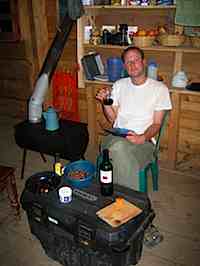 Hello again, one and all. We are back at home in the mountains, and as per usual Fletch has put out something like 3 posts to my one. My excuse would be that I’ve been working like crazy since we got back…but so has he. There’s this thing that happens when I feel like too much is going on in my brain; I find myself standing frozen in the middle of the room letting everything race through my brain rather than actually doing something physical about it all–this after hours of sitting in front of a computer or already running around like mad. And after the frozen moment occurs, I decide the best thing to do is sit down with my book and ignore stuff for a while. I don’t usually see this happening to Fletch. I have my suspicions that while I’m spacing or ignoring things, he’s writing blog posts, as his computer tolerance is infinitely higher than my own. Hello again, one and all. We are back at home in the mountains, and as per usual Fletch has put out something like 3 posts to my one. My excuse would be that I’ve been working like crazy since we got back…but so has he. There’s this thing that happens when I feel like too much is going on in my brain; I find myself standing frozen in the middle of the room letting everything race through my brain rather than actually doing something physical about it all–this after hours of sitting in front of a computer or already running around like mad. And after the frozen moment occurs, I decide the best thing to do is sit down with my book and ignore stuff for a while. I don’t usually see this happening to Fletch. I have my suspicions that while I’m spacing or ignoring things, he’s writing blog posts, as his computer tolerance is infinitely higher than my own.
That said, what have we been doing? As Fletch mentioned before my dad worked tirelessly for us during our stint in the states, finding us contacts that can potentially help us with, I think, every single one of our current projects, and in some cases adding more projects to the list. We have been working out those contacts since just after we touched down here. So much great stuff was generated during our trip home it’s given us a lot to work on. Thank you Rotarians for all the great suggestions and contacts after our presentation there. Fletch and I are finally getting paired up with schools in the states to be pen pals and share our experiences with the students. The first class to take us up on the offer is from Howes Military Academy in Indiana. Any other teachers out there are welcome to join in the fun. Also, I’ve been invited to write a monthly guest column for the Pharos-Tribune in my home town. Lots to do…
We literally stepped off the plane and into a contact meeting with a man named Mario–a successful, young business man who happens to have been an exchange student that lived with my Dad’s cousins almost twenty years ago. How random, right? The cousins were in Guatemala visiting Mario in August, but since we’d just arrived in site, and our site is WAY out of everyone’s way, we never met up with the Hoots. Thankfully, they left us Mario, who, if nothing else happens in the future, did give us a ride in his very nice, comfortable car from the airport to Antigua (yay for not paying for a shuttle!) and then took us to lunch at his cousins new, and quite delicious restaurant (yay for free lunches, especially ones that good!). Mario seems willing to try and help us in any way he can, our most pressing need at the moment being getting 7 boxes of computer equipment from the US to Guatemala as cheaply and efficiently as possible. Go Mario. He also seems willing to accompany us on some big volcano climbs and perhaps get us tickets to a Carlos Santana concert in Guate? We’re cool with both of those plans. Thanks a lot, Hoots, for our contact twenty years in the making. All that said, I hope we do see Mario again in the future.
After lunch he dropped us off at Fletch’s former host family’s house where we spent our first night back in country. The host family loved Mario, as he came in and told them, “I’ve brought them here because they said you all treat them well.” And that’s a fact, they do. Since we ended up sleeping two hours in the states before boarding our plane, then did this lunch thing upon arrival, we were close to half-dead within an hour of playing with kids. We took nap shifts, and then handed out the presents we got them in the states, BOOKS! They were all pretty stoked about that. I had almost no voice at the end of the night for reading aloud, over and over and over “Green Eggs and Ham”, “The True Story of the Three Little Pigs,” and “Curious George”, all in Spanish, close to five times each. Books are pretty exciting here, as they’re really expensive compared to the salaries people earn so it’s not uncommon for people to own not a single book–a pretty foreign concept for Fletch and I, brought up on books by non-stop reading parents. It was great to see the kids so happy.
Here I should mention, I was kind of afraid of going home to the states, of being hit hard with culture shock and therefore not fully enjoy the trip. It wouldn’t be out of the ordinary for me to freak out, but thankful that never happened. We spent every moment possible with friends and family, most of that time in their homes sharing meals (i.e. us enjoying delicious, hard to come by foods from the US, yay!), and I never once felt overwhelmed. Then I worried maybe the shock would be in coming back to Guatemala. But that wasn’t the case either. We just went from family and friends in the US back to family and friends in Guatemala. It was awesome to realize we’ve adapted enough to feel at home in both places. A professor of mine, who’s worked a great deal in Latin America, gave me a piece of advice before I left to come here; “Just remember to think of them as two different worlds. Your goals can not be the same there as they are here. In the states my to-do list for a day is longer than my to-do list for a week or month there. You can’t hold them [the US and Guatemala] to the same standards.” I’ve remembered that often, but wasn’t entirely confident in my ability to do that. Now I think I have succeeded in doing that.
We didn’t linger with the family on Saturday morning, as the new PC trainee was moving in that day at 11 am, and we didn’t want to make her feel uncomfortable. I had the experience on the day I moved in with my family that their former trainee came by and it was really weird, as they’ve got this long established relationship, and the trainees (me in this instance) by that time they’re dropped off with family’s have been through 5 insanely intense days in Washington and Santa Lucia where the training center is located. When the girl’s bags showed up we hit the road. We ended up splitting the trip into 3 days of 4 hours each, which was really nice. We saw some PCV friends along the way and made it home not too worse for wear. We also avoided getting home on a Sunday, which is market day so quite impossible to fit ourselves and luggage in on the last leg of the journey. PLUS on Monday the post-office was open, and as you all know WE GOT OUR NEW STOVE! That was a fantastic Christmas Present from us to us.
We came stumbling in to Temux about 12pm Monday with all our bags, two big boxes of stove parts, plus a bag of produce hastily purchased to get us through until the Sunday market. A man herding his sheep left them a while to help us carry things to our house. And from that moment on we had the bottom of our door latched with kids hanging over the top, peering in at everything coming out of bags and boxes, watching the general goings on. I got two words for you: Gringo Zoo. In all honesty everyone was pretty thrilled to see us come home. Kids were squealing with joy, the adults were all smiles. As happened when we were supposed to show up here to live our Peace Corp boss, also on vacation at the time, began getting calls to see when we’d be back. He assured them everything was running on schedule and we’d be back in a timely fashion. The day we arrived we were invited to come live in Temux forever, or at least buy some land where we could build a house and come visit from time to time. At least we know we’re wanted here. : )
Monday was sunny but cold. We unpacked, cleaned up, did the curing burn for the stove which definitely excited folk’s curiosity. At one point when we’d finished putting the clubhouse back in order it was quite uncomfortably cold inside, but the stove was burning in the yard so I took my book and sat out by the warm fire reading. I was very sad when it was dark and cold and I had to leave the stove burning in the yard. So we divided tasks for the next day: Fletch went into town to buy the supplies we needed to install the stove ASAP, and I washed all our dirty clothes and made bread. By mid-afternoon the stove was put together in the house, just as the cold outside was topped off with rain. To celebrate our inaugural blaze we busted out our hidden bottle of wine, accompanied with some cheese we’d picked up in Huehue and grapes bought in town that day. We like to think we’ve cultivated a kind of life we call “ghetto gourmet”. We drink the wine out of old jam jars because we’ve continued to be too cheap to buy glasses, and the jam and peanut bar jars just keep accumulating. I guess that leaves money for a modest wine stash doesn’t it?
The weather proceeded to be nothing but wind, fog, rain and, to break it, up occasionally driving rain from Tuesday afternoon until today. By Wednesday night the front wall of our house was wet at all the board joints and water was running down the wall. That had never happend to us before but lucky for us, there’s a huge crack in the floor at the wall, so we didn’t have to worry about water accumulation. It was as though the weather Gods wanted to show us how nasty they could be competing against our stove. We would have been pretty miserable without it. We’ve found the kitchen half of our house actually feels very cozy on days like that if we both have the wood stove burning and bake something in the oven. There’s an appreciable difference of temperature between outside and inside (amazing!), and with warm currents running through the house we’ve been able to spot drafts we need to weatherize that we couldn’t identify before because air was running in and making us cold from every direction before. For example, there is a huge draft that comes up right under our work desks which we’d never noticed before but probably made us miserable in a secret, insidious way until now. We are busting the caulk out on spots like that.
The stove has so many wonderful things about it, like, now our clothes dry in under a week while hanging inside. In the fall,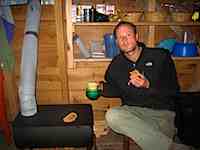 when we hit rain spells, things would hang about for two weeks, and we still had to wait for the sun to come out and finish up the job. NOT anymore! Also, on these terrible weather days when we sit around and work and read and drink tea and coffee I can take forever to drink one cup of coffee and have it warm from start to finish because the stove is an enormous hot plate. It also makes toast as Fletch demonstrates here. We love toast. This stove is great. Happiness is our little camp stove. when we hit rain spells, things would hang about for two weeks, and we still had to wait for the sun to come out and finish up the job. NOT anymore! Also, on these terrible weather days when we sit around and work and read and drink tea and coffee I can take forever to drink one cup of coffee and have it warm from start to finish because the stove is an enormous hot plate. It also makes toast as Fletch demonstrates here. We love toast. This stove is great. Happiness is our little camp stove.
Unlike this post seems to indicate up to this point, we actually did not just sit around and admire the many functions of the stove all week. That was merely what we did in our free time. We’ve been working on hooking up with a group in Florida that made some 5000 mid-wife kits last year to try and get them to donate a small portion of the remaining 1000 kits to our local project. They seem like they might be happy with that idea, which would help us a lot. The kits aren’t as complete as the ones we had in mind, which is why there are specific items we’re still looking for people to donate, or, if they want, to donate money to purchase up to 130 of any given item. When we spoke to one of the women in charge she sounded kind of sad, as they found out after the fact that many of the kits that were sent through apparently reliable routes last year, somehow found their way into the wrong hands. The kits were in some cases disassembled and sold for parts, and the midwives didn’t actually get to use them at all. Welcome to the twisted world of development and foreign aid. It’s so sad, but true. We can get the kits directly to the midwives, and if it works with us there might be other volunteers in our program who could benefit from the program.
We’ve sent numerous inquiry emails about shipping for the computer center, and about selling the women’s handmade bags. We’ve also scheduled a meeting in Antigua the end of this month to meet up with a Rotarian from Oregon who started a stove project in Central America, working largely in Guatemala and El Salvador, to tour the stove factory near Antigua, see how these tiny, inexpensive, efficient stoves are made, and think about whether or not they’d work way out in Quixabaj were everyone is dirt poor and cooking over open fires.
A few days after we get back from that meeting, with the Rotarian’s intern in-tow so she can see what it’s really like out here, we’re all planning on taking a trip out to Quixabaj, first time since September, before the road collapsed. I feel like we really owe the village a visit, but I’m also kind of dreading it a little. It’s hard. Hard to get there, hard to see people living like that, hard to feel like the talks we give are worthwhile since they’ve now come 5 months apart, hard to fight the extreme male chauvinism of the place. It’s also hot, and we sleep in the health center, where at night the secret inhabitants come crawling out…giant cockroaches. But at least in the health center there’s an indoor toilet, and it’s not a latrine. There are some nice folks that live there too, and really if we didn’t go back I’d just feel like I was abandoning them, same as everybody else has done over the years, if they even knew about them in the first place. You know their own mayor has never even been out there?
So as far as January goes, it’s a short work month but awfully full of business. Going north for the holidays was a fantastic break. We were so so SO happy to see everyone we got to meet up with, to rest, to enjoy the life of convenience, ahh to visit “hippy” grocery stores again. And coupling the visits with presentations, while getting a break, helped us gain the needed motivation to get back here and into action. Thanks to everyone who gave us gifts of warmth this year: thermal underwear, smartwool socks, hats etc. They’ve all been put to great use this past week, I assure you. Thanks to those of you who felt like slipping us some dinero here and there, to pay for gas from place to place, and buy us our favorite soaps, contact solution, toothpaste (and that’s not just me buying products; Fletch-o is a very particular kind of guy;). We returned well equipped for the next few months. I admit, it was a great relief to both of us to come back and feel like things around us were suddenly affordable again switching from the dollar to the Quetzal.
Thanks everyone, again and again and again, thank you for just being there for us, loving us and supporting us in all the ways you all do while we’re down here. We love you, and are already back to missing you.
Peace out, for now.
Posted by: emily
Friday, January 16th, 2009 at 7:12 pm
 I was wandering around the village today, looking for signatures for a thank-you letter I am sending to a church that donated funds for our projects. School registration is on this week and next, so I stumbled into the community center to see if anyone I needed was inside. What I found instead was all the teachers, two of which were manning a makeshift registration desk. The other half-dozen were huddled around a low table, playing cards with the principal. It made me laugh out loud, and reminded me of that “dogs playing poker” painting. Then I remembered: it’s been a while since I posted a random, slice-of-life-in-Guatemala post. So, here goes. I was wandering around the village today, looking for signatures for a thank-you letter I am sending to a church that donated funds for our projects. School registration is on this week and next, so I stumbled into the community center to see if anyone I needed was inside. What I found instead was all the teachers, two of which were manning a makeshift registration desk. The other half-dozen were huddled around a low table, playing cards with the principal. It made me laugh out loud, and reminded me of that “dogs playing poker” painting. Then I remembered: it’s been a while since I posted a random, slice-of-life-in-Guatemala post. So, here goes.
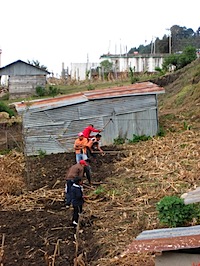 Agriculture Agriculture
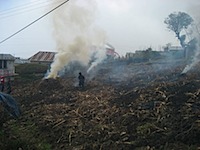 Everyone’s tilling their fields, getting ready for next month’s planting. It’s too steep here for mechanical cultivation (tractors, harrows, etc.) so they do it all the way they’ve done it since before Columbus… with a hoe and a lot of muscle. Here’s a picture of a “Guatemalan tractor” turning up the field next to our house. Once that’s done, they then burn all the cornstalks from the previous year. This was annoying to Emily, who just put our laundry on the line an hour before this all started. As it is, our clothes smell smoky after we visit any of the neighbors, but it’s nice to at least START without smelling like a campfire. Everyone’s tilling their fields, getting ready for next month’s planting. It’s too steep here for mechanical cultivation (tractors, harrows, etc.) so they do it all the way they’ve done it since before Columbus… with a hoe and a lot of muscle. Here’s a picture of a “Guatemalan tractor” turning up the field next to our house. Once that’s done, they then burn all the cornstalks from the previous year. This was annoying to Emily, who just put our laundry on the line an hour before this all started. As it is, our clothes smell smoky after we visit any of the neighbors, but it’s nice to at least START without smelling like a campfire.
Baby Animals
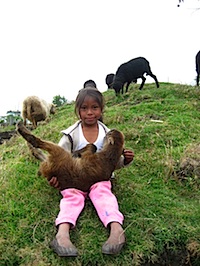
We’ve 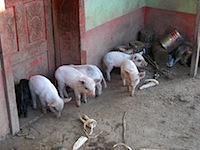 seen a lot of cute animals lately. Our newest discovery is piglets. There are a few in the neighboring village, oinking and trotting around and being generally crazy every time we show up to give a lecture. Today, when we were walking in the mountains above our own village, we passed a house that had a grunting sow with half a dozen REALLY tiny piggies. They look and act like puppies when they are that small, it’s hilarious. There are other funny animals around here, too. Nas Palas’s flock had a new lamb when we were in the US; its fleece is a pretty golden color (unlike most of the black sheep in the flock). Here’s a picture of one of the neighborhood kids (Anish) holding the little blighter. seen a lot of cute animals lately. Our newest discovery is piglets. There are a few in the neighboring village, oinking and trotting around and being generally crazy every time we show up to give a lecture. Today, when we were walking in the mountains above our own village, we passed a house that had a grunting sow with half a dozen REALLY tiny piggies. They look and act like puppies when they are that small, it’s hilarious. There are other funny animals around here, too. Nas Palas’s flock had a new lamb when we were in the US; its fleece is a pretty golden color (unlike most of the black sheep in the flock). Here’s a picture of one of the neighborhood kids (Anish) holding the little blighter.
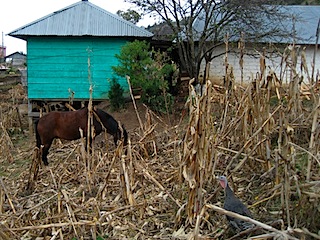 Horses Horses
I am not a big fan of horses. Our neighbors, however, have one that is in pretty good shape. Unlike the skeleton-horses one usually sees in Guatemala, this horse is well-fed, strong, and healthy. The other day I heard a funny noise, and looked out the window of the clubhouse to see Mr. Chej (my name for him; they don’t name horses here) tied up to one of the stilts that holds up the house.
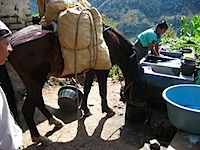
He was in the field below, happily eating his fill of cornstalks, one of his favorite snacks. “Please, sir, do not bolt away and cause my house to collapse down the hill,” I quietly asked him as he was snacking. Perhaps he was listening; he tends to think of himself as a person. He even likes to sneak a drink up at the house when no one is looking. Notice in the first picture that the turkey is also enjoying the leftover pickings in the corn field. And, yes, that is the very same turkey that I threw rocks at last month for terrorizing my broccoli patch.
Socializing
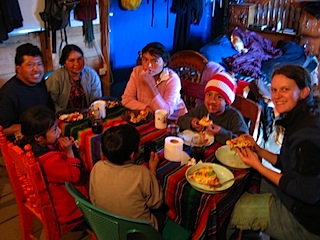 We occasionally have people over for dinner. Here we see Pedro, my friend and Q’anjob’al teacher, along with his family. We invited him and his wife over for a pizza, because he mentioned that it was something he missed from the US. We were surprised when they showed up with four relatives in tow; this is a very Guatemalan thing to do, but it stressed Emily out because we didn’t cook THAT much pizza. But, things worked out: everyone except Pedro and his nephew were so scared of this strange thing called “pizza” that they dared not even try it. Instead, they went to the one store in town and bought some ramen noodles, which we cooked up for them. We occasionally have people over for dinner. Here we see Pedro, my friend and Q’anjob’al teacher, along with his family. We invited him and his wife over for a pizza, because he mentioned that it was something he missed from the US. We were surprised when they showed up with four relatives in tow; this is a very Guatemalan thing to do, but it stressed Emily out because we didn’t cook THAT much pizza. But, things worked out: everyone except Pedro and his nephew were so scared of this strange thing called “pizza” that they dared not even try it. Instead, they went to the one store in town and bought some ramen noodles, which we cooked up for them.
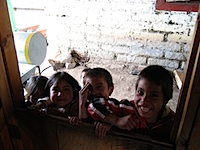 The next picture is what we see most every day: more kids watching us through the top half of our door. They never seem to tire of it. “What is that?” “Are there cookies today?” “Who is that a picture of?” “What is that?” “Can I come in to play?” “Computers! Cool!” “Can I use your machete?” “He hit me!” “What is that?” The next picture is what we see most every day: more kids watching us through the top half of our door. They never seem to tire of it. “What is that?” “Are there cookies today?” “Who is that a picture of?” “What is that?” “Can I come in to play?” “Computers! Cool!” “Can I use your machete?” “He hit me!” “What is that?”
Really, it’s quite entertaining. And when we tire of them, we just close the door. Within an hour, they get bored and go home.
Gardening
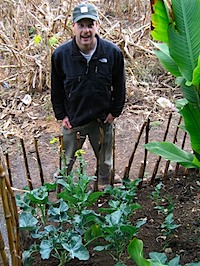 I’ve been growing some broccoli, to try to get to locals interested in producing some healthy green vegetables locally, instead of buying them in town (or not at all). Here’s me and my broccoli patch, which I am pleased to announce is doing fine, thanks to a new chicken wire fence I built to keep the turkeys out. I also must credit Galindo, who has taken an interest in the garden and has helped me a bunch- he even kept it watered for me while I was in the USA. He seems to be doing much better now, a few months after the Tamarron incident. I’ve been growing some broccoli, to try to get to locals interested in producing some healthy green vegetables locally, instead of buying them in town (or not at all). Here’s me and my broccoli patch, which I am pleased to announce is doing fine, thanks to a new chicken wire fence I built to keep the turkeys out. I also must credit Galindo, who has taken an interest in the garden and has helped me a bunch- he even kept it watered for me while I was in the USA. He seems to be doing much better now, a few months after the Tamarron incident.
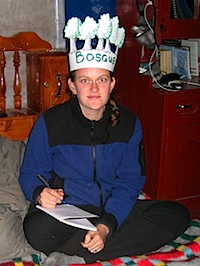 We talk about gardens and trees and such in our health lectures, too. Here is Emily, testing out a bosque (forest) hat that we used for one of our games. Looking rediculous is where it’s at, I’m telling ya. We talk about gardens and trees and such in our health lectures, too. Here is Emily, testing out a bosque (forest) hat that we used for one of our games. Looking rediculous is where it’s at, I’m telling ya.
Posted by: jfanjoy
|
|
|
































